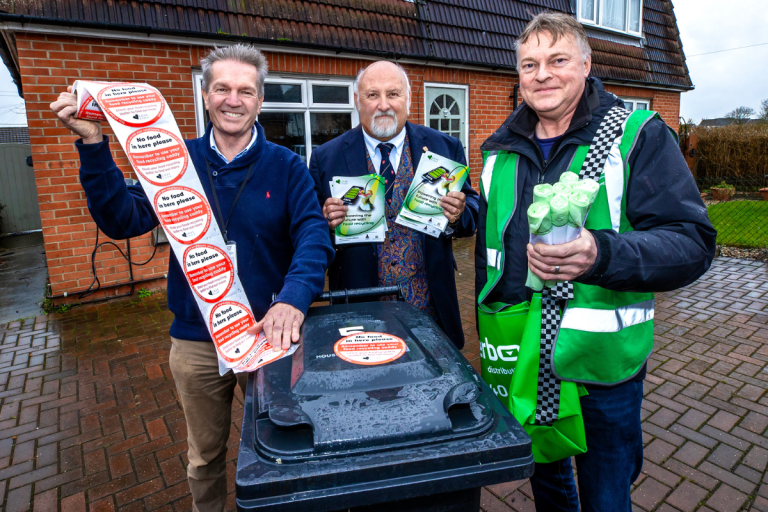The food recycling project

What was the food recycling project?
Essex County Council (ECC) designed a county-wide approach using WRAP best practice methodology, local research, and case studies from UK local authorities. The council also carried out a pilot study in one area of Essex to test materials and methodology.
Working in partnership with Essex district, city and borough councils, the project ran from March 2023 to March 2024 and consisted of three phases that were delivered to nine areas in total.
- phase one (July - August): Braintree, Colchester & Epping Forest
- phase two (September - January 2024): Harlow, Tendring & Uttlesford
- phase three (January 2024 - March): Basildon, Maldon & Rochford
Residents that lived in participating areas received:
- a ‘no food in here please’ sticker secured to wheeled general rubbish bins
- a one-off delivery of a roll of compostable food caddy liners
- an information leaflet about the benefits of recycling your food
The goals and measures of the project were:
- deliver a physical package made up of the three items to 375,000 eligible households
- support the physical roll-out with county-wide and area-specific communications
- work in partnership with the nine Waste Collection Authorities (WCAs)
- achieve a 10% increase in food tonnage recycled at kerbside
- save £206,000 from avoided disposal
The project was a first of its kind at ECC. Never had the council delivered a project on such an extensive scale with physical deliveries made to households across the whole county. The scale and ambition of the project reflected the high proportion of food found in residual waste and the need to increase participation in the long-standing food recycling services.
What the project achieved
The Food Recycling Project has far exceeded targets. The impact of the project so far:
- 375,108 households across the nine eligible areas received materials
- food recycling tonnage data shows an average increase of 21% when comparing first three-month post-delivery with previous year. This is more than double the target set. Breakdown:
- phase one – 19% increase
- phase two – 15% increase
- phase three – 29% increase
- initial avoided disposal cost savings are on track to exceed the project target
- an estimated reduction in CO2e emissions of over 90% based on shifting food waste from disposal at landfill to recovery at anaerobic digestion
- ongoing monitoring on tonnage, savings and CO2e emissions is taking place to understand the lasting impact of the intervention to understand whether further investment or intervention is required to maintain performance levels
- increased caddy requests from residents and operational feedback observing increased food recycling volumes and participation
- worked with 19 internal and external stakeholders in total
- various communications promoting the project including a BBC Essex radio interview, over 5.6 million impressions across Meta, YouTube, and Google, and an animated Rubbish Rumours series
What’s next for food recycling?
ECC works to support the WCAs in improving and promoting the food recycling service available throughout Essex via ongoing promotional work regarding food recycling and service provision.
The council is eager to maintain the momentum of this project and continue investing in food recycling by:
- continuing to assess the tonnage data to provide both short and long-term impacts. This will inform ECC what further interventions are required and when
- carrying out a participation study to see how the project has shifted resident action
- investing in another food project targeting an additional 130,000 households
Further information
Did you know?
Roughly 25% of waste thrown away in the general rubbish bin in Essex is food.
